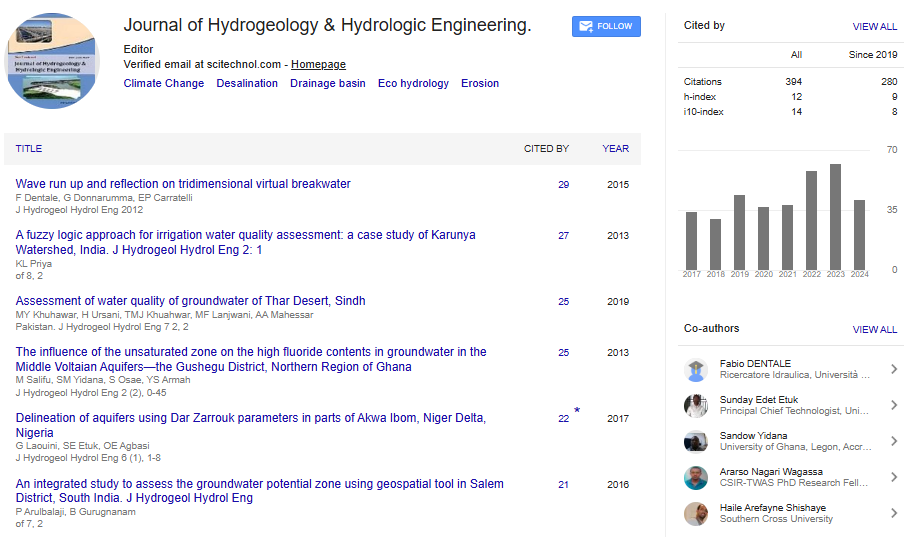Commentary, J Hydrogeol Hydrol Eng Vol: 12 Issue: 4
The Importance of Water Sustainability Techniques to Maintain Water Quality
Natalia Hoyos*
1Department of Geology, Guilin University of Technology, Guilin, China
*Corresponding Author: Natalia Hoyos,
Department of Geology, Guilin University
of Technology, Guilin, China
E-mail: hoyosn456@gmail.com
Received date: 17 July, 2023, Manuscript No. JHHE-23-114471;
Editor assigned date: 19 July, 2023, PreQC No. JHHE-23-114471 (PQ);
Reviewed date: 03 August, 2023, QC No. JHHE-23-114471;
Revised date: 11 August, 2023, Manuscript No. JHHE-23-114471 (R);
Published date: 21 August, 2023, DOI: 10.4172/2325-9647.1000280
Citation: Hoyos N (2023) The Importance of Water Sustainability Techniques to Maintain Water Quality. J Hydrogeol Hydrol Eng 12:4.
Description
Water is the base of our planet, essential for all living organisms. It's a finite resource, and as the global population continues to grow, so does the strain on our water supply. One of the most pressing challenges of our time is ensuring access to clean and safe water for all while protecting and maintaining water quality. To address this challenge, water sustainability techniques have become increasingly important. These techniques are designed to manage, conserve, and protect our water resources to maintain their quality for current and future generations.
Water sustainability techniques encompass a wide range of strategies and practices that aim to balance the water needs of society, the environment, and the economy. The importance of these techniques in maintaining water quality cannot be overstated, as poor water quality poses severe risks to public health, ecosystems, and economic stability.
One of the primary aspects of water sustainability techniques is water conservation. As populations grow and industrial activities increase, the demand for water escalates. Implementing water conservation measures can help reduce the strain on water sources. Simple actions like fixing leaks, using water-efficient appliances, and promoting responsible water use in agriculture can go a long way in preserving our water resources and preventing pollution.
Another essential aspect of water sustainability is the protection of watersheds. Watersheds are regions that collect and channel water into rivers, lakes, or underground aquifers. Protecting these areas from pollution and overdevelopment is essential to maintaining water quality. Proper land use planning and the establishment of buffer zones can help prevent contaminants from entering our water sources.
Furthermore, sustainable agriculture practices are vital for water quality. Agriculture is a significant consumer of water, and traditional farming methods often involve the excessive use of water and chemical inputs. By adopting sustainable farming practices like precision irrigation, organic farming, and agroforestry, we can reduce the amount of pollutants entering our water bodies and protect the quality of our water resources.
Wastewater treatment is another precarious component of water sustainability. Proper treatment of sewage and industrial effluents is necessary to remove pollutants before they are discharged into rivers or oceans. Advanced treatment technologies and stringent regulations are essential to ensure that the water returned to the environment is safe and clean.
Climate change is also a growing threat to water quality. Changes in temperature and precipitation patterns can alter the distribution and quality of water resources. Droughts, floods, and extreme weather events can exacerbate water scarcity and pollution issues. To address this, sustainable water management plans need to consider climate adaptation strategies to safeguard water quality in a changing world.
Ecosystems play an essential role in maintaining water quality. Wetlands, forests, and aquatic habitats act as natural filters, purifying water and providing habitat for diverse species. Protecting and restoring these ecosystems is an integral part of water sustainability. Additionally, preserving biodiversity helps maintain the balance of aquatic ecosystems, preventing the proliferation of harmful species that can degrade water quality.
In urban areas, green infrastructure is gaining recognition as an effective water sustainability technique. Green roofs, permeable pavement, and urban parks can help absorb rainwater, reduce runoff, and filter pollutants, ultimately improving water quality. These green solutions also enhance the quality of life in cities by providing green spaces and reducing the urban heat island effect.
Education and public awareness are indispensable tools in achieving water sustainability goals. When individuals and communities understand the importance of water conservation and responsible water use, they are more likely to adopt sustainable practices. Governments, non-governmental organizations, and educational institutions all have a role to play in disseminating knowledge about water sustainability.
Conclusion
The importance of water sustainability techniques in maintaining water quality cannot be overstated. As the global population grows and environmental pressures mount, it is imperative that we take proactive measures to protect and preserve our water resources. Water sustainability encompasses a multifaceted approach, including conservation, protection of watersheds, sustainable agriculture, wastewater treatment, climate adaptation, ecosystem preservation, and green infrastructure. By implementing these techniques and fostering public awareness, we can ensure that clean and safe water remains accessible for current and future generations. Water is not just a resource; it is a lifeline, and its sustainable management is a moral and practical imperative.
 Spanish
Spanish  Chinese
Chinese  Russian
Russian  German
German  French
French  Japanese
Japanese  Portuguese
Portuguese  Hindi
Hindi 
